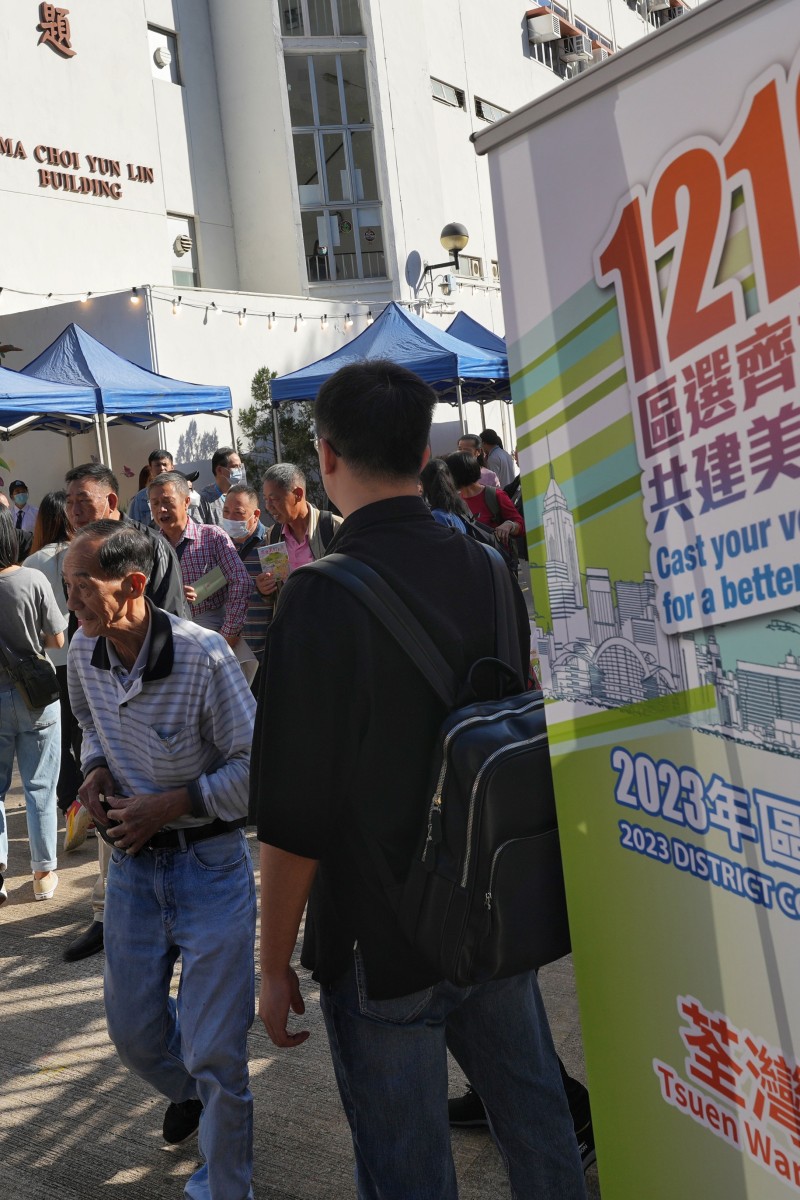
- Authorities reported that around 27.54% of eligible voters took part this year, the lowest since return to Chinese rule in 1997
- Sunday’s poll was a sharp drop from the 71.23% recorded in the last municipal-level vote in 2019 held at the height of the anti-government protests
 Voters head to polling stations at Tung Wah Group of Hospitals Kap Yan Directors’ College in Sheung Shui to vote in the district council election. Photo: Elson Li
Voters head to polling stations at Tung Wah Group of Hospitals Kap Yan Directors’ College in Sheung Shui to vote in the district council election. Photo: Elson LiHong Kong saw low voting numbers in its first district council poll following an electoral overhaul ordered by Beijing, with an overall voter turnout of 27.54 per cent, a record low since the return to Chinese rule in 1997. The number was recorded despite tycoons and political leaders mounting an unrelenting drive to get out the vote and a sudden extension of polling hours.
The turnout for Sunday’s poll was a sharp drop from the 71.23 per cent recorded in the last municipal-level vote in 2019 held at the height of the anti-government protests in which the opposition bloc scored a landslide victory, and also down 8.28 percentage points from the previous lowest participation rate of 35.82 per cent in 1999.
The Legislative Council election revamped under the “patriots-only” rule in 2021 logged a turnout rate of 30.2 per cent.
All about Hong Kong government branches and their role in bid to ban ‘Glory to Hong Kong’
In contrast to the usual practice of announcing the final figure shortly after voting ends, authorities released the number nearly eight hours later. Polling stations were hit by a computer system failure just two hours before the election was supposed to end. This forced authorities to issue ballots manually before extending voting hours by 90 minutes.
Beijing on Monday offered its congratulations, saying the poll was important in implementing the principle of “patriots governing Hong Kong”.
The State Council’s Hong Kong and Macau Affairs Office said more than 1.19 million people had voted to counter the “smearing” of the poll. The office also spelled out five expectations for those elected, including putting more effort into implementing the “one country, two systems” governing principle, resolving conflicts, doing practical things for residents, uniting society and fulfilling their duties.
Chief Executive John Lee Ka-chiu acknowledged the final turnout figures and said the “high-quality” election “fully shows our excellent election culture and highlights the revamped district council system as being far superior”.
Electoral Affairs Commission chairman Mr Justice David Lok Kai-hong on Monday apologised again for the system glitch, becoming emotional as he said he was indebted to his colleagues for their efforts in running the election.
Early on Monday morning, Lee said he was “highly concerned” about the failure and that a task force led by Senior Counsel Bernard Man, the Electoral Affairs Commission and police would be set up to investigate the cause. It would submit a report in three months, he added.
“One of the election missions is to ensure the voting and counting process runs smoothly, and those expectations were not met,” Lee said at a polling station at Queen’s College at around 2am.
“But the unexpected accident is similar to extreme weather, a power outage or flooding. The important thing is that we have bottom line thinking and a plan B for any emergencies.”
Lee said he understood that candidates and volunteers had to put in longer hours, but he also defended the extended voting hours, saying it was a fair solution for all the hopefuls.
Voting continued until midnight and counting of about 1 million ballots began shortly after at the more than 600 polling stations and was expected to last well into early Monday morning.
Authorities issued the final turnout number without providing the hourly figure from 8.30pm onwards, with a source familiar with electoral operations saying it was neither accurate nor fair to release the hourly numbers after switching to manual counting.
Since Hong Kong returned to Chinese rule in 1997, previous lows in voter turnout for district council polls were 35.82 per cent in 1999 and 38.83 per cent in 2007. The highest turnout came during the previous municipal-body election in 2019, when the participation rate hit 71.23 per cent.
Veteran politician Tam Yiu-chung, who formerly served as the city’s sole delegate to the nation’s top legislative body, said the voter turnout was “reasonable” and commended the government’s publicity work.
Since the social environment had stabilised, voters had less motivation to vote as they knew all candidates were patriotic, Tam told a radio show on Monday morning.
“If authorities do not promote the elections enough, voters will not understand the new system and may not participate,” he said.
“The promotional activities can help increase public awareness and improve the election atmosphere.”
The turnout on Sunday for the district committees constituency election was 96.92 per cent, with 2,454 selected voters casting ballots.
Lee, who voted early in the morning at the Raimondi College polling station in the Mid-Levels with his wife Janet Lam Lai-sim, said the election was about voter education and breaking away from the rancorous politics of the past where opponents had sought to bring down Beijing and the local government.
“With this new chapter, the district councils from now on will serve the public and do their job. We need to explain and introduce this important matter to residents clearly,” he said.